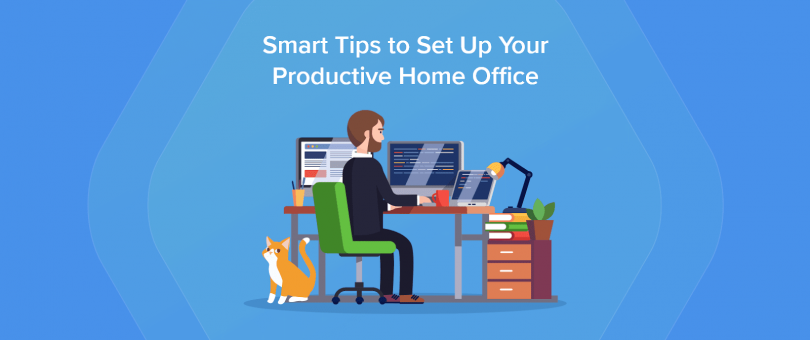Productive home office — is there really such a thing?
What is the first thing that comes to mind when you think of a home office? Is it something like this:
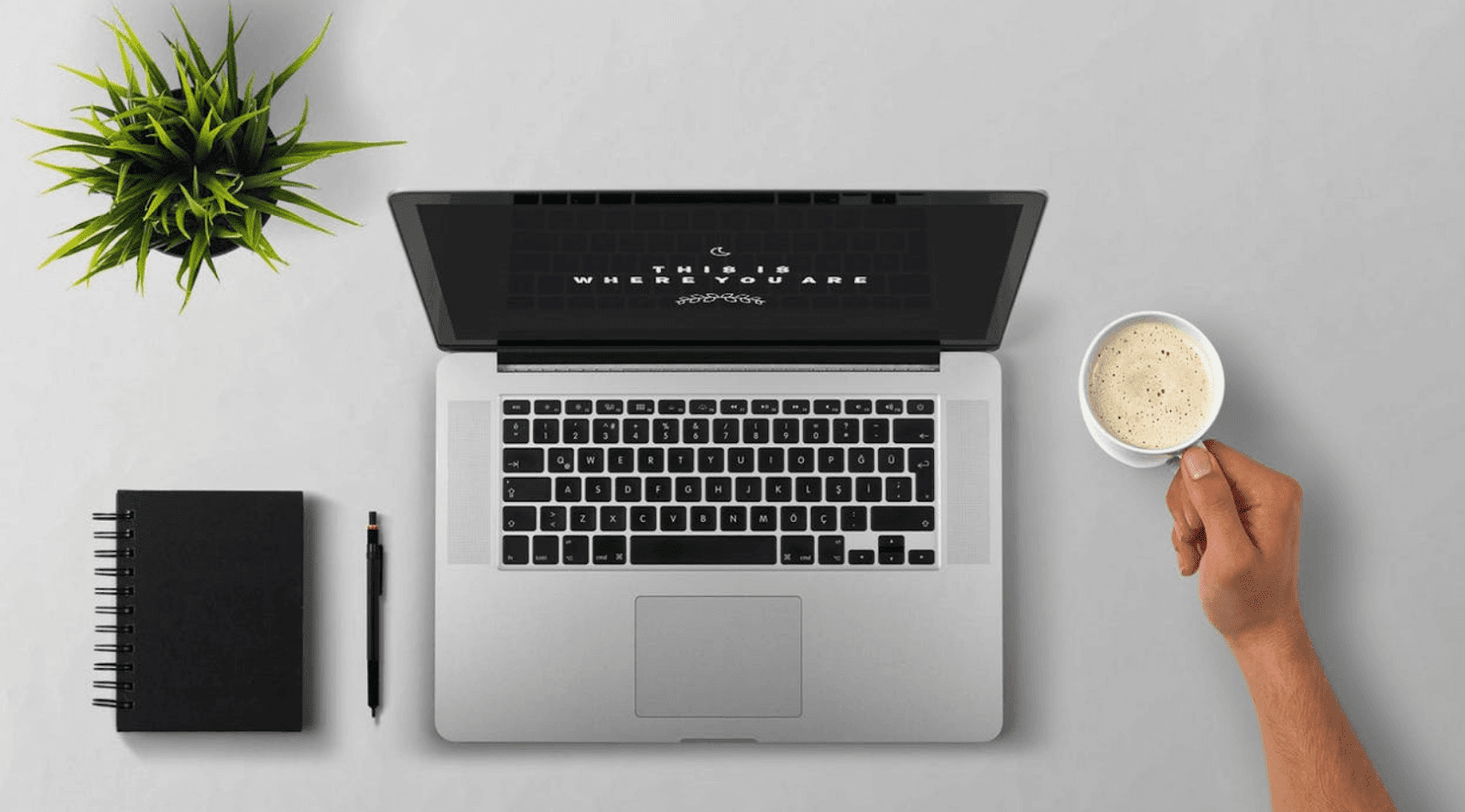
Or more like this:
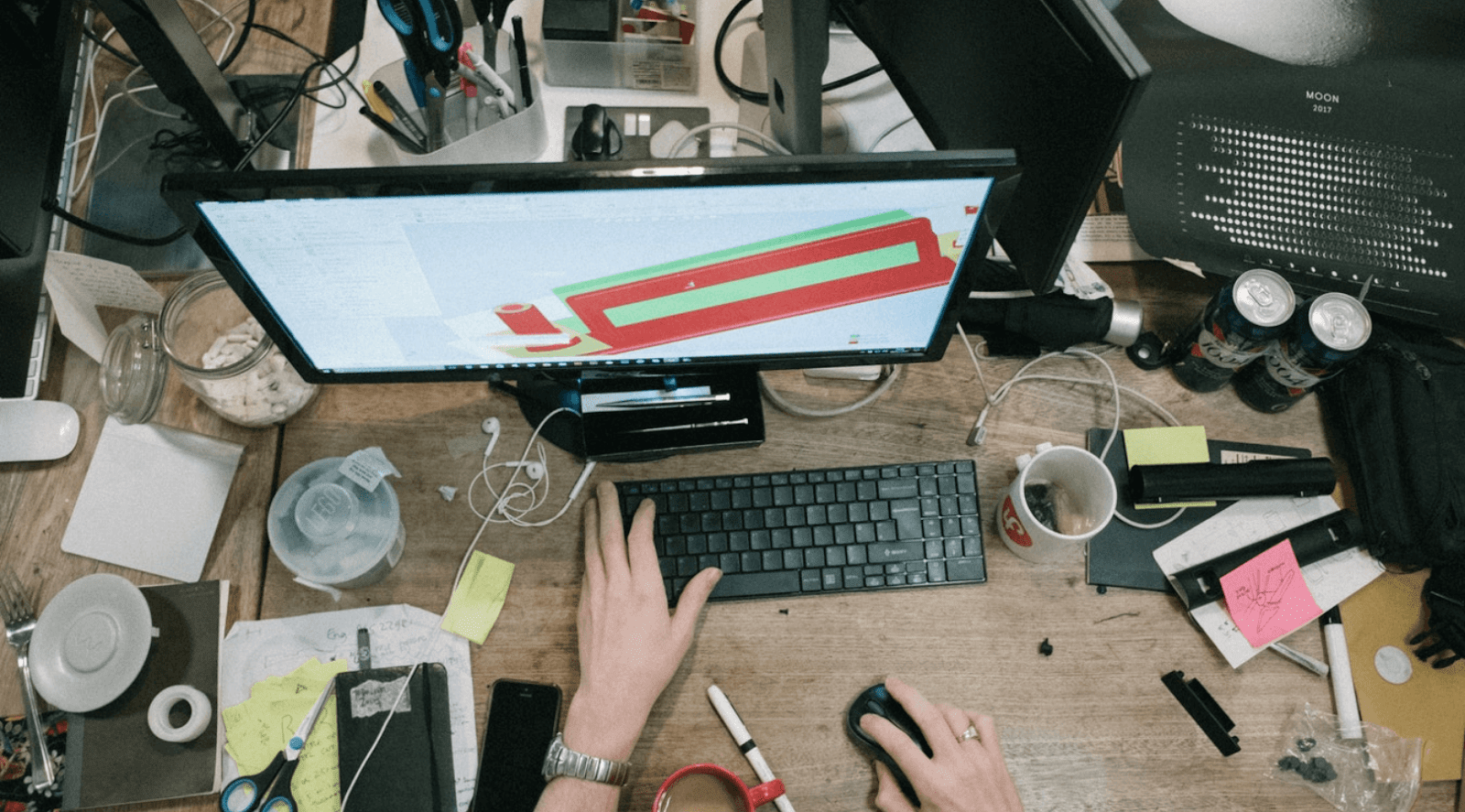
Home offices come in all shapes, sizes, and states of disarray; the important part is to stick with what works for you. If you’ve never worked from home before, you probably don’t yet know what that is. This blog post will help. We will discuss the main questions to ask before and while setting up a home office and will share our own experiences, fails, and eventual successes.
DevriX has always been a distributed agency and as a result, a lot of us have tried working from home. And while some of us still prefer working at the office or the local hookah bar, most have enough experience with work from home to give pointers. Here are some of the tried and true tips we’ve followed to create our own home office spaces.
Rule One: Don’t Rush to Ikea
Probably the most important lesson we’ve learned is to not buy stuff before we need it. This is especially important when it comes to furniture. Think long and hard before ordering that fancy standing desk or the beautiful, but ultimately, uncomfortable chair. Your working space should be about efficiency more than anything else.
Since we are in the WordPress development business, ‘home office’ for most of us means a laptop, a good chair, and not much else. Your definition may be different but some of the basics probably include:
- Designated workspace
- Comfortable furniture
- Good lighting
- No outside noises
- Heating/air-conditioning
- Privacy
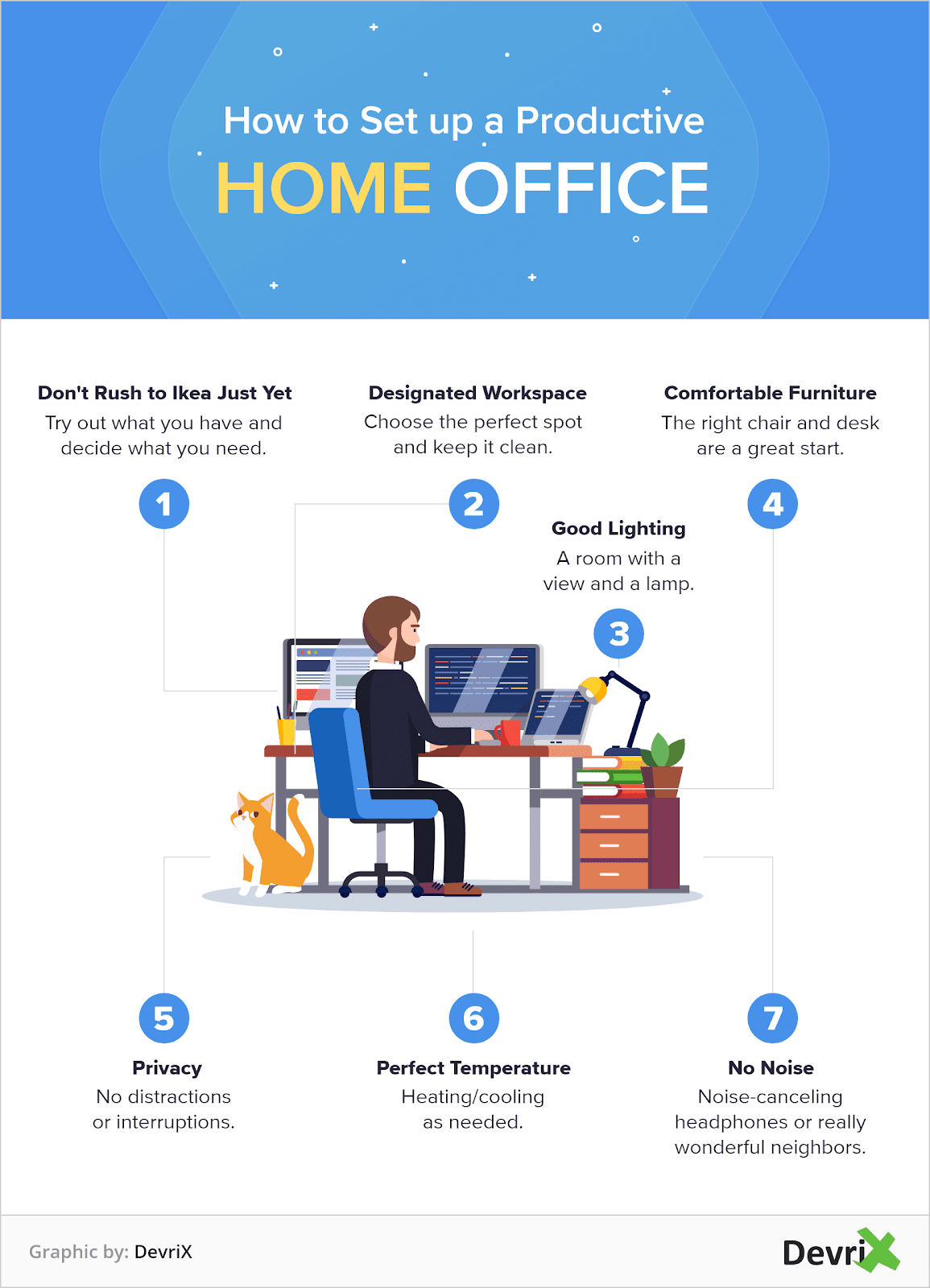
Those are the things you should start with. And the best way to ensure that you’ve got everything right is to test it. A member of our team spent the first month of her remote work experience sitting on a kitchen chair in front of a picnic table in her bedroom. Back pain quickly taught her all she needed to know about the desk and office chair she wanted. She got the perfect setup and hasn’t looked back.
Below are some tips from the members of the DevriX team who like working from home. We have divided the tips into three main categories. As you will see, home offices are not as straightforward as we thought.
Choosing the Perfect Spot
Most advice out there goes: “Don’t set up your home office in your bedroom.” We’d say “don’t make your bed your home office” because that really truly never works. For starters, using a mouse, resting your elbows on something and having tea/coffee on the bed is not a good option.
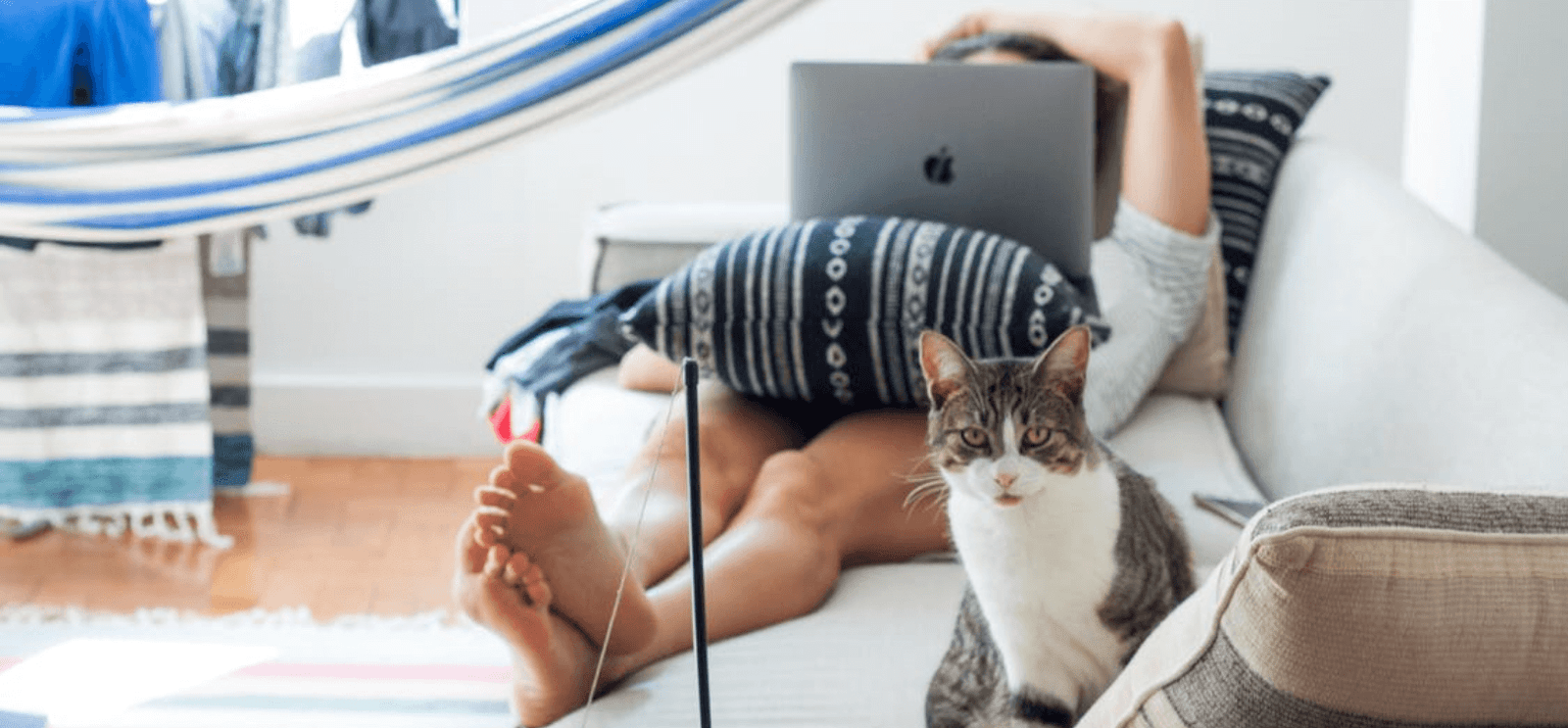
If you don’t have a spare room, try to separate your home office from the rest of the room. Move things around until it feels right. It should be both cozy and as non-distracting as possible. Whatever you do, call it an office and mark it clearly as such. You need to be able to “leave the office” at the end of the workday.
Furniture
Sitting Arrangements
Invest in a good chair and desk – you will feel more productive just looking at them! Also, you will avoid all kinds of nasty health issues. Remember, they don’t need to be expensive to be comfortable.
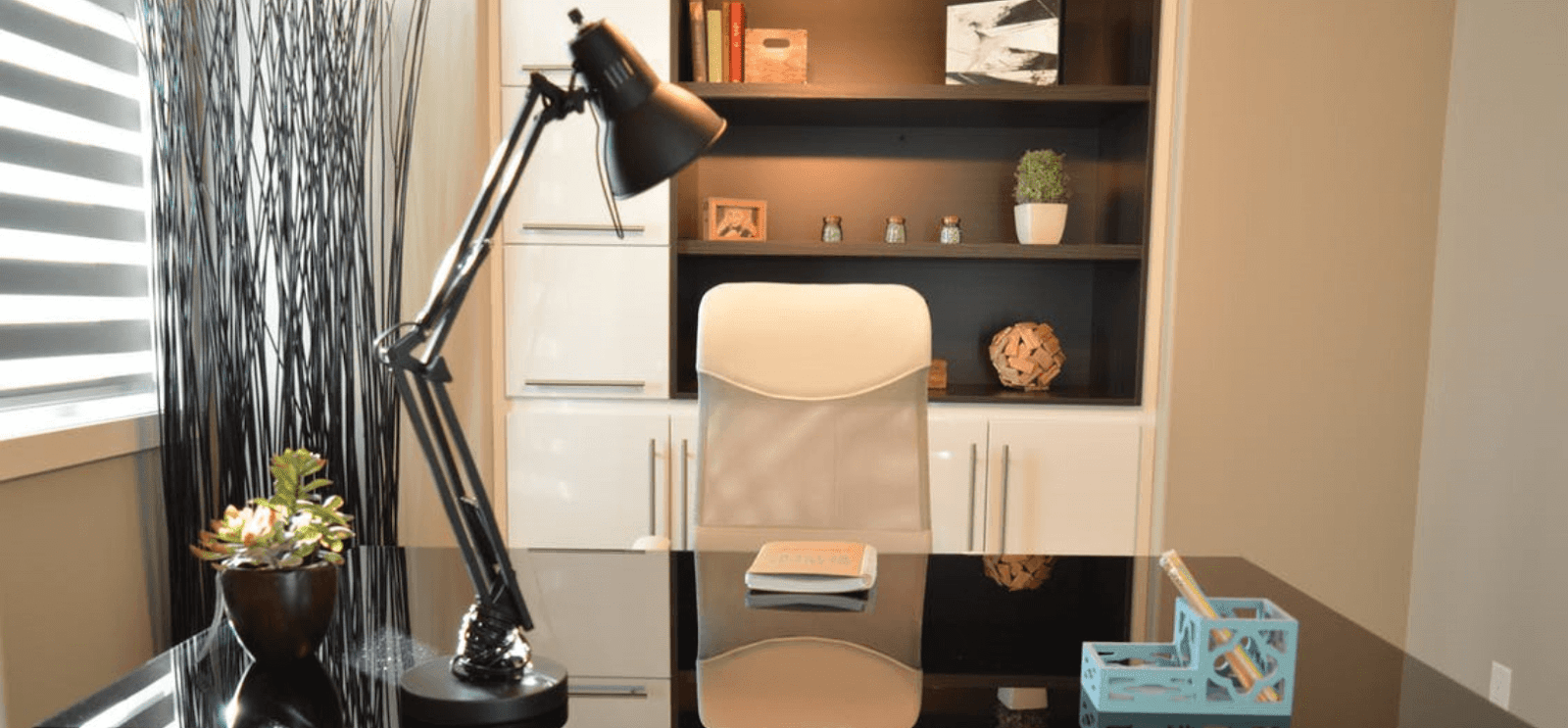
Organization
Keep what you need close at hand and everything else should be out of the way. Simple, yet effective. Especially if you regularly have to make sure everything is in its right place (see “Tidy workspace” below).
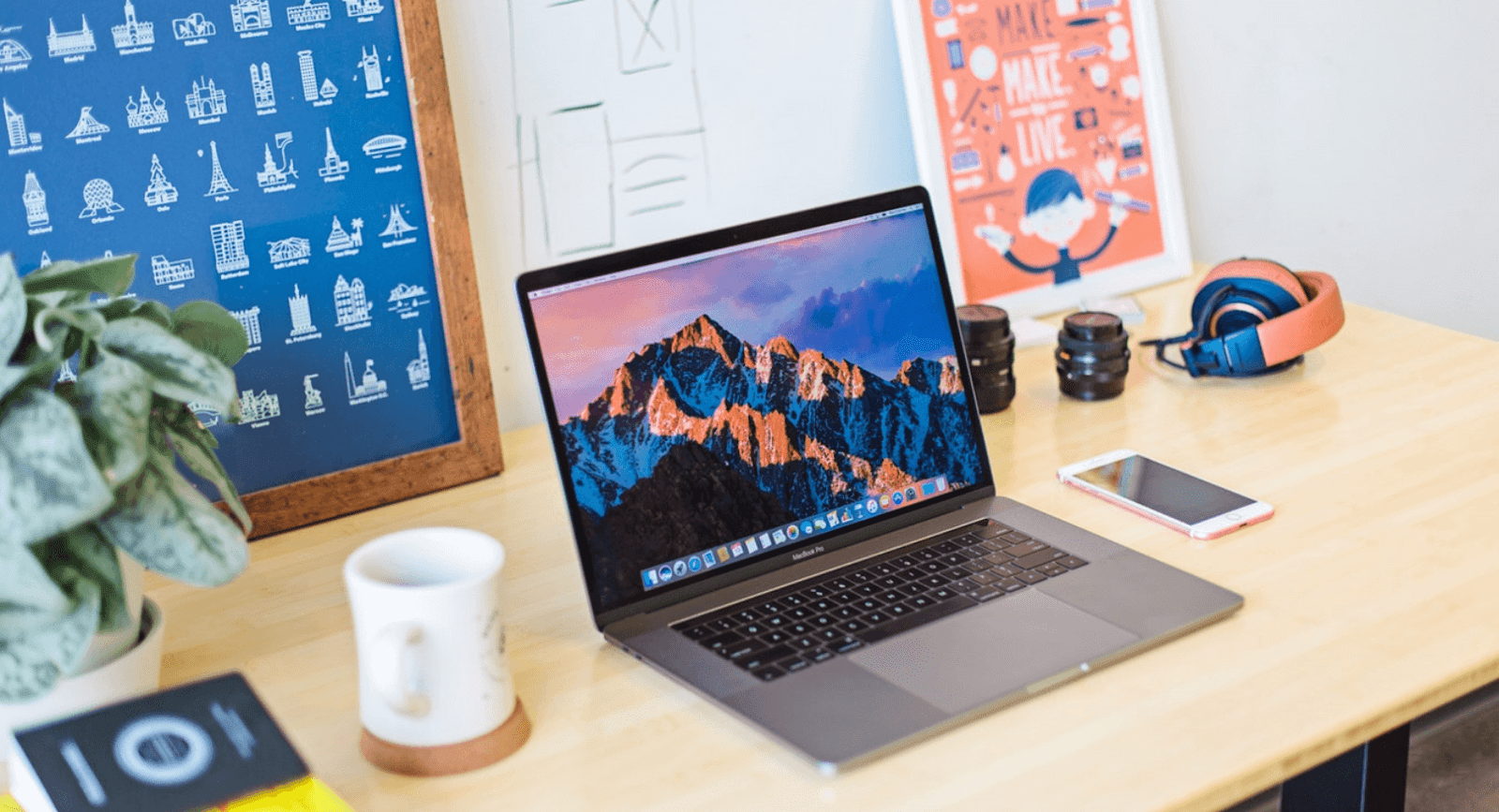
PRO Tip: Beyond the Basics
Think long and hard before spending on luxuries like a big (or a second) monitor, a wireless keyboard, or anything else you cannot easily carry around. Remote work usually allows you to work anywhere in the world. If you decide to go away for a while you may not be able to bring along all of those extra gadgets and therefore your productivity may suffer.
However, if you avoid the temptation of extra luxuries, you won’t have to worry about not having them when you are on the go between home and someplace else. Not all of us here at DevriX agree on this but it’s a tradeoff so make a conscious decision.
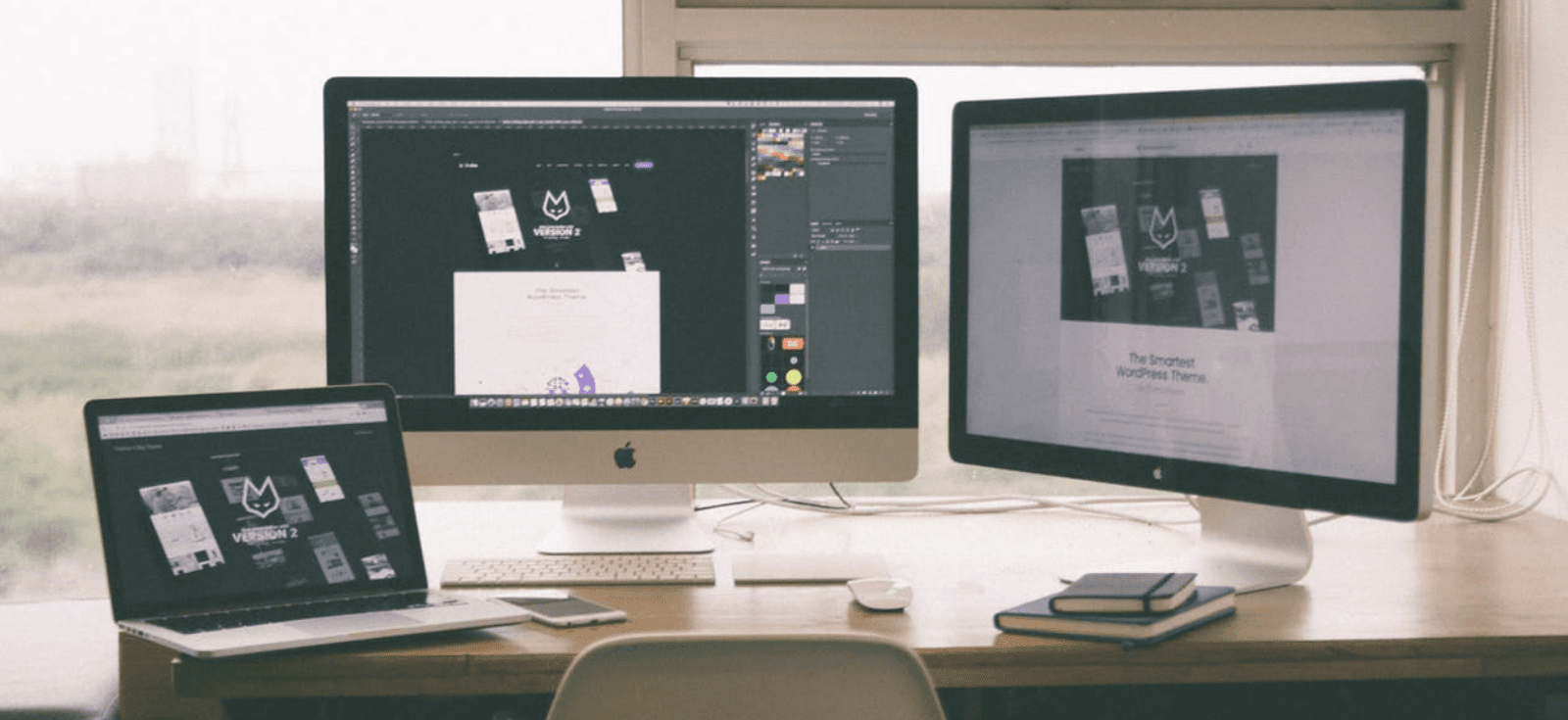
Things You Probably Don’t Need
A Standing Desk
This is a very popular item on people’s wish list these days. Standing desks are said to contribute to better blood flow and posture while helping you burn a few extra calories. They can also be quite expensive. Most of us here at DevriX prefer to take a break and go for walk every once in a while instead.
Extra Storage Space
Depending on your job you might need some extra space or none at all. Google Drive and Dropbox likely provide you with all the storage space you can use. If you need the physical type, go for a smaller, better organized, covered space to protect from dust and coffee spills. Keep near you only what you need daily to prevent clutter and make tidying up easier.
Ambience
Light
Light is extremely important for your health, the quality of your work and even your mood. Choose a spot in your home that has enough natural lighting and a good lamp for the evenings and nights. You may also consider ways to protect your eyes from the blue light of your screen, especially if you work at night.
A good app to reduce the blue light your monitor emits is f.lux (available on Windows, Mac, iPhone and rooted Android devices). Some devices, including Windows 10 ones, already have an app for that but some of us like f.lux better.
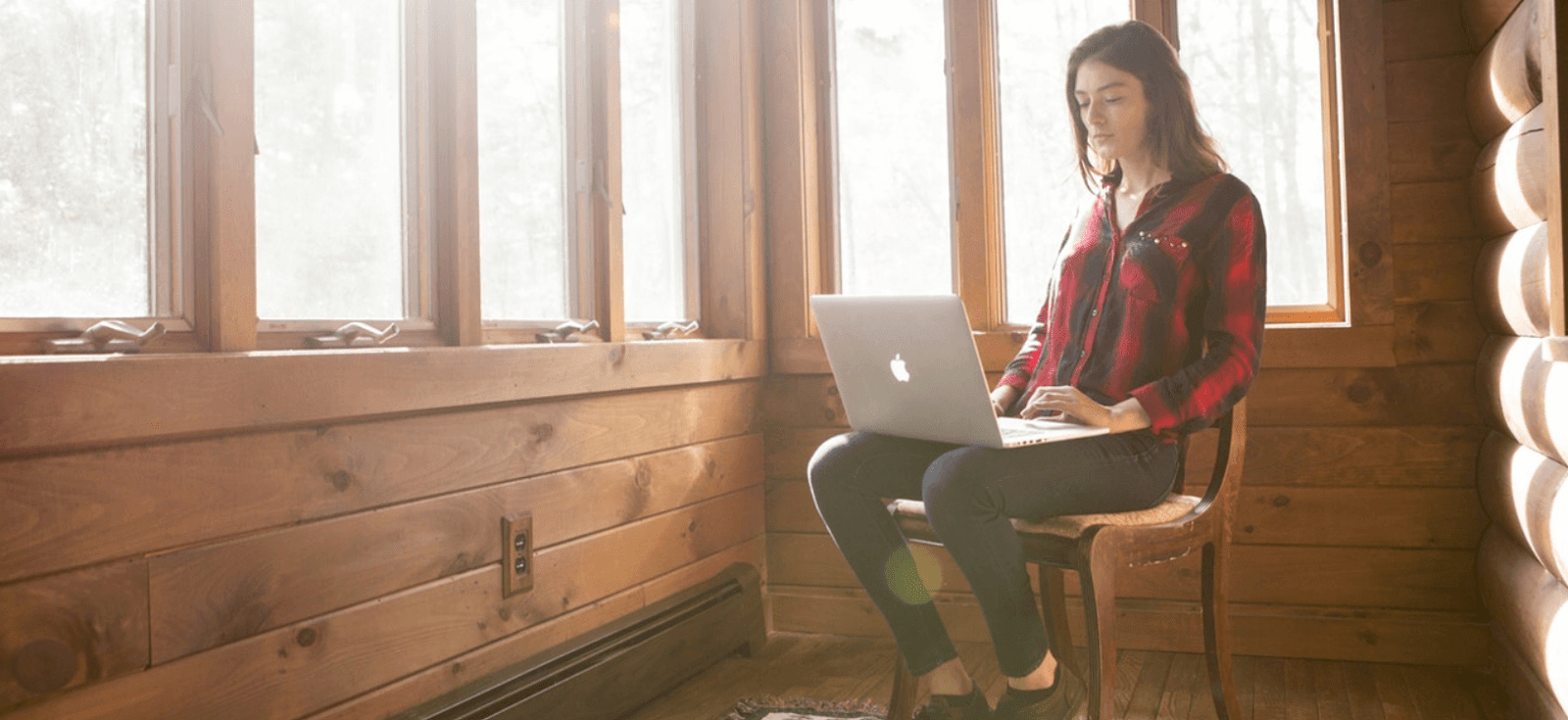
Noise
If you don’t have a quiet working environment, invest in some noise-cancelling headphones. The loud neighbors and the whiny dog that someone left alone in the apartment below can be very distracting. Same goes for anything that might be happening in the next room if you don’t live alone.
Temperature
You probably know what room temperature works best for you. Working from home has the perk of not having to partake in any air-conditioning wars. Set yourself up for success by making sure your workspace has a heater, a fan, or just a big window.
Tidy Workplace
By keeping your workplace clean and tidy at all times you deny yourself an excuse to procrastinate. You will also never again waste time looking for something if you always put it away in the same place. The process of cleaning and tidying also has a meditative quality that many people enjoy – especially at end of a long day when you want to relax and switch off work. So, even though you might be the type who likes a bit of chaos, ask yourself this: Does being unorganized really help you?
Related article: Project Management Strategies That Can Take Your Work to New Heights
Staying Motivated
When working from home you don’t have anyone to control and motivate you so you have to motivate yourself. This might mean a detailed plan, lots of alarms and a very tidy desk. It might also mean motivational posters on all of the walls. Or it might be the sound of rain in your headphones. In some extreme cases, it might mean removing anything remotely interesting from your surroundings (especially the bed). Whatever works, use it.
Related article: Proven Ways to Improve the Productivity of Your Business
Interruptions
If you’re not living alone, it might take a while for the rest of the family to get used to you being there, yet not being “home”. We, at DevriX, are very aware of this problem. By setting expectations and being firm you’ll eventually get your point across. If not – there’s always the treehouse.

Things You Probably Don’t Need
Plants
They produce oxygen which is definitely good for your brain. On the other hand, plants are not everybody’s cup of tea. Our office at DevriX compensates for the lack of plants with an open window. Making sure your room is well-aired at all times keeps your mind focused and your brain fog-less. Plants are entirely optional.
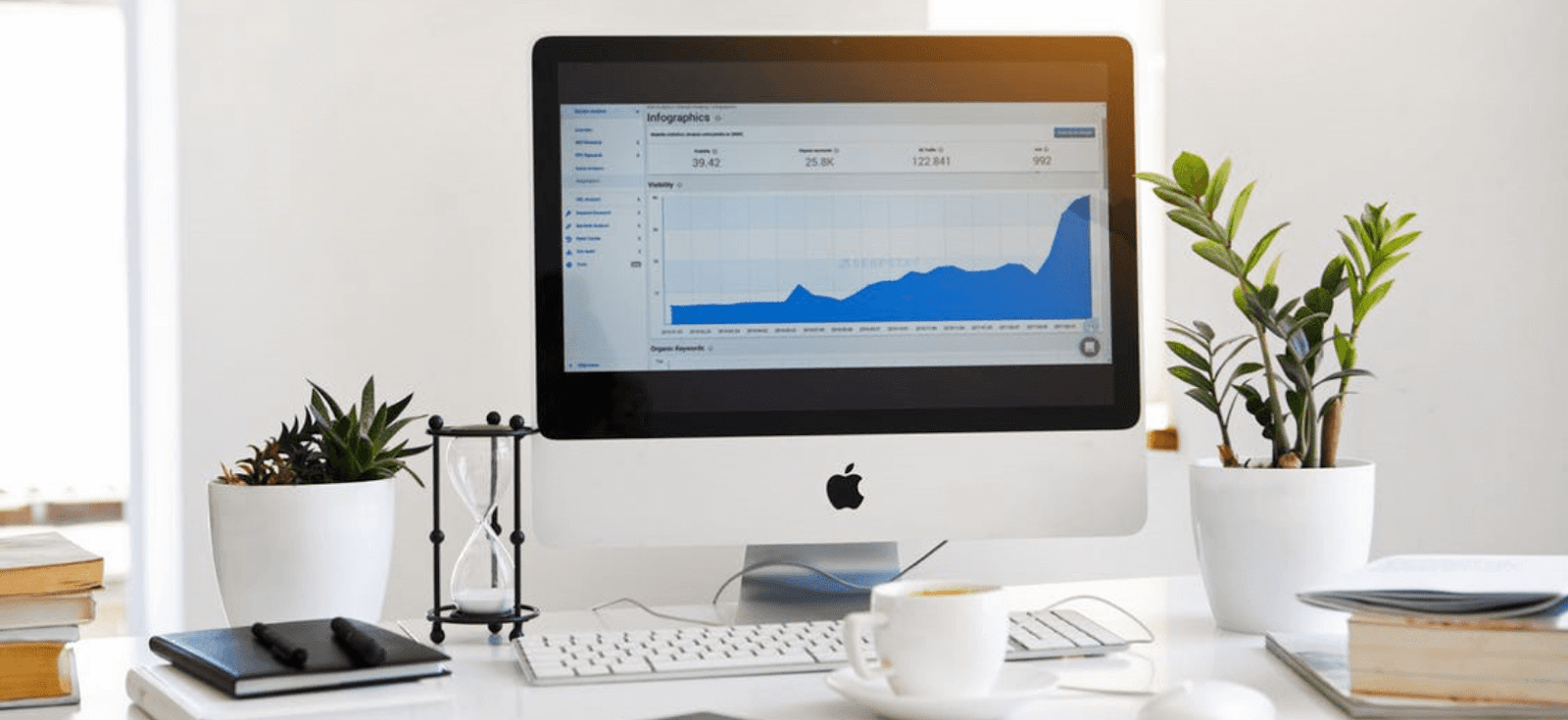
Extra PRO Tip: Office Hours
If you are an entrepreneur or a small business owner, your work hours are probably crazy. That’s expected. You still shouldn’t be working all the time. Several different studies have found a small but statistically significant association between working long hours and depressive symptoms and episodes. Make sure you switch off every once in a while and both your productivity and mood will improve.
Related article: 100+ Small Business Marketing Statistics and Trends in 2018
Conclusion
Your home office can be productive and calming at the same time, but it takes some trial and error to get there. The process will differ greatly from person to person and from business to business. As a general rule of thumb, always start with what you have before getting anything new. This will make it easy to see exactly what you need. Invest in your surroundings to ensure the proper state of mind. And don’t forget your comfort and health – those two will sometimes clash in the short run, so think about the big picture.
To get our latest business and technology emails, please subscribe below. Also, let us know how working from home goes and if the tips helped!
